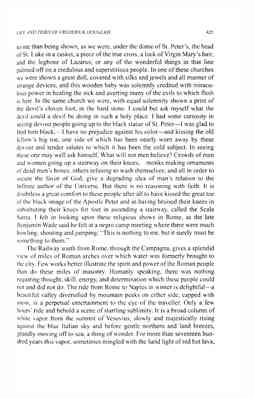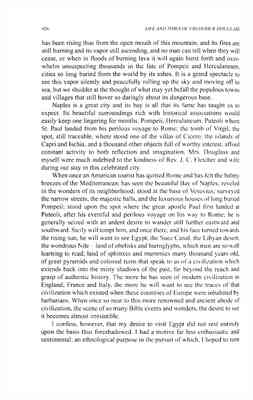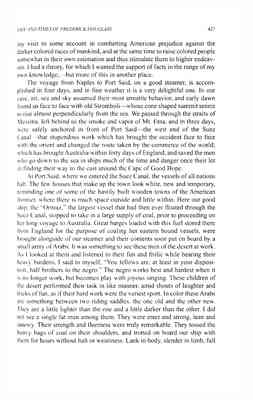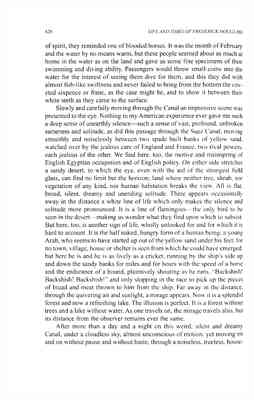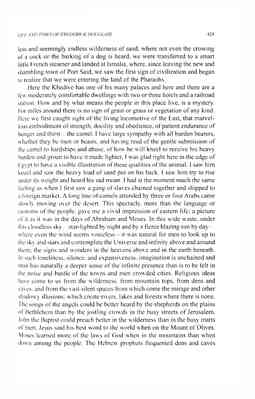Pages
51
LIFE AND TIMES OF FREDERICK DOUGLASS 425
to me than being shown, as we were, under the dome of St. Peter's, the head of St. Luke in a casket, a piece of the true cross, a lock of Virgin Mary's hair, and the legbone of Lazarus; or any of the wonderful things in that line palmed off on a credulous and superstitious people. In one of these churches we were shown a great doll, covered with silks and jewels and all manner of strange devices, and this wooden baby was solemnly credited with miraculous power in healing the sick and averting many of the evils to which flesh is heir. In the same church we were, with equal solemnity shown a print of the devil's cloven foot, in the hard stone. I could but ask myself what the devil could a devil be doing in such a holy place. I had some curiosity in seeing devout people going up to the black statue of St. Peter-I was glad to find him black. – I have no prejudice against his color – and kissing the old fellow's big toe, one side of which has been nearly worn away by these dernut and tender salutes to which it has been the cold subject. In seeing these one may well ask himself, What will not men believe? Crowds of men and women going up a stairway on their knees;– monks making ornaments of dead men's bones; others refusing to wash themselves; and all in order to secure the favor of God, give a degrading idea of man's relation to the Infinite author of the Universe. But there is no reasoning with faith. It is doubtless a great comfort to these people after all to have kissed the great toe of the black image of the Apostle Peter and in having bruised their knees in substituting their knees for feet in ascending a stairway, called the Scala Santa. I felt in looking upon these religious shows in Rome, as the late Benjamin Wade said he felt at a negro camp meeting where there were much howling, shouting and jumping; "This is nothing to me, but it surely must be something to them."
The Railway south from Rome, through the Campagna, gives a splendid view of miles of Roman arches over which water was formerly brought to the city. Few works better illustrate the spirit and power of the Roman people than do these miles of masonry. Humanly speaking, there was nothing requiring thought, skill, energy. and determination which these people could not and did not do. The ride from Rome to Naples in winter is delightful– a beautiful valley diversified by mountain peaks on either side, capped with snow, is a perpetual entertainment to the eye of the traveller. Only a few hours' ride and behold a scene of startling sublimity. It is a broad column of white vapor from the summit of Vesuvius, slowly and majestically rising against the blue Italian sky and before gentle northern and land breezes, grandly moving off to sea, a thing of wonder. For more than seventeen hundred years this vapor, sometimes mingled with the lurid light of red hot lava,
52
426 LIFE AND TIMES OF FREDERICK DOUGLASS
has been rising thus from the open mouth of this mountain, and its fires are still burning and its vapor still ascending, and no man can tell when they will cease, or when in floods of burning lava it will again burst forth and overwhelm unsuspecting thousands in the fate of Pompeii and Herculaneum, cities so long buried from the world by its ashes. It is a grand spectacle to see this vapor silently and peacefully rolling up the sky and moving off to sea, but we shudder at the thought of what may yet befall the populous towns and villages that still hover so daringly about its dangerous base.
Naples is a great city and its bay is all that its fame has taught us to expect. Its beautiful surroundings rich with historical associations would easily keep one lingering for months. Pompeii, Herculaneum, Puteoli where St. Paul landed from his perilous voyage to Rome; the tomb of Virgil; the spot, still traceable, where stood one of the villas of Cicero; the islands of Capri and lschia, and a thousand other objects full of worthy interest, afford constant activity to both reflection and imagination. Mrs. Douglass and myself were much indebted to the kindness of Rev. J. C. Fletcher and wife during our stay in this celebrated city.
When once an American tourist has quitted Rome and has felt the balmy breezes of the Mediterranean; has seen the beautiful Bay of Naples; reveled in the wonders of its neighborhood; stood at the base of Vesuvius; surveyed the narrow streets, the majestic halls, and the luxurious houses oflong buried Pompeii; stood upon the spot where the great apostle Paul first landed at Puteoli, after his eventful and perilous voyage on his way to Rome; he is generally seized with an ardent desire to wander still further eastward and southward. Sicily will tempt him, and once there, and his face turned towards the rising sun, he will want to see Egypt, the Suez Canal, the Libyan desert, the wondrous Nile– land of obelisks and hieroglyphs, which men are so well learning to read; land of sphinxes and mummies many thousand years old, of great pyramids and colossal ruins that speak to us of a civilization which extends back into the misty shadows of the past, far beyond the reach and grasp of authentic history. The more he has seen of modern civilization in England, France and Italy, the more he will want to see the traces of that civilization which existed when these countries of Europe were inhabited by barbarians. When once so near to this more renowned and ancient abode of civilization, the scene of so many Bible events and wonders, the desire to see it becomes almost irresistible.
I confess, however, that my desire to visit Egypt did not rest entirely upon the basis thus foreshadowed. I had a motive far less enthusiastic and sentimental; an ethnological purpose in the pursuit of which, I hoped to turn
53
LIFE AND TIMES OF FREDERICK DOUGLASS 427
my visit to some account in combatting American prejudice against the darker colored races of mankind, and at the same time to raise colored people somewhat in their own estimation and thus stimulate them to higher endeavors. I had a theory, for which I wanted the support of facts in the range of my own knowledge,– but more of this in another place.
The voyage from Naples to Port Said, on a good steamer, is accomplished in four days, and in fine weather it is a very delightful one. In our case, air, sea and sky assumed their most amiable behavior, and early dawn found us face to face with old Stromboli– whose cone shaped summit seems to rise almost perpendicularly from the sea. We passed through the straits of Messina, left behind us the smoke and vapor of Mt. Etna, and in three days, were safely anchored in front of Port Said– the west end of the Suez Canal– that stupendous work which has brought the occident face to face with the orient and changed the route taken by the commerce of the world; which has brought Australia within forty days of England, and saved the men who go down to the sea in ships much of the time and danger once their lot in finding their way to the east around the Cape of Good Hope.
At Port Said, where we entered the Suez Canal, the vessels of all nations halt. The few houses that make up the town look white, new and temporary, reminding one of some of the hastily built wooden towns of the American frontier, where there is much space outside and little within. Here our good ship, the "Ormuz," the largest vessel that had then ever floated through the Suez Canal, stopped to take in a large supply of coal, prior to proceeding on her long voyage to Australia. Great barges loaded with this fuel stored there from England for the purpose of coaling her eastern bound vessels, were brought alongside of our steamer and their contents soon put on board by a small army of Arabs. It was something to see these men of the desert at work. As I looked at them and listened to their fun and frolic while bearing their heavy burdens, I said to myself, "You fellows are, at least in your disposition, half brothers to the negro." The negro works best and hardest when it is no longer work, but becomes play with joyous singing. These children of the desert performed their task in like manner, amid shouts of laughter and tncks of fun, as if their hard work were the veriest sport. In color these Arabs are something between two riding saddles, the one old and the other new. They arc a little lighter than the one and a little darker than the other. I did not see a single fat man among them. They were erect and strong, lean and sinewy. Their strength and fleetness were truly remarkable. They tossed the heavy bags of coal on their shoulders, and trotted on board our ship with them for hours without halt or weariness. Lank in body, slender in limb, full
54
428 LIFE AND TIMES OF FREDERICK DOUGLASS
of spirit, they reminded one of blooded horses. It was the month of February and the water by no means warm, but these people seemed about as much at home in the water as on the land and gave us some fine specimens of their swimming and diving ability. Passengers would throw small coins into the water for the interest of seeing them dive for them, and this they did with almost fish-like swiftness and never failed to bring from the bottom the coveted sixpence or franc, as the case might be, and to show it between their white teeth as they came to the surface.
Slowly and carefully moving through the Canal an impressive scene was presented to the eye. Nothing in my American experience ever gave me such a deep sense of unearthly silence– such a sense of vast, profound, unbroken sameness and solitude, as did this passage through the Suez Canal, moving smoothly and noiselessly between two spade built banks of yellow sand, watched over by the jealous care of England and France, two rival powers, each jealous of the other. We find here, too, the motive and mainspring of English Egyptian occupation and of English policy. On either side stretches a sandy desert, to which the eye, even with the aid of the strongest field glass, can find no limit but the horizon; land where neither tree, shrub. nor vegetation of any kind, nor human habitation breaks the view. All is flat, broad, silent, dreamy and unending solitude. There appears occasionally away in the distance a white line of life which only makes the silence and solitude more pronounced. It is a line of flamingoes– the only bird to be seen in the desert– making us wonder what they find upon which to subsist. But here, too, is another sign of life, wholly unlooked for and for which it is hard to account. It is the half naked, hungry form of a human being, a young Arab, who seems to have started up out of the yellow sand under his feet, for no town, village, house or shelter is seen from which he could have emerged; but here he is and he is as lively as a cricket, running by the ship's side up and down the sandy banks for miles and for hours with the speed of a horse and the endurance of a hound, plaintively shouting as he runs, "Backshish! Backshish! Backshish!" and only stopping in the race to pick up the pieces of bread and meat thrown to him from the ship. Far away in the distance, through the quivering air and sunlight, a mirage appears. Now it is a splendid forest and now a refreshing lake. The illusion is perfect. It is a forest without trees and a lake without water. As one travels on, the mirage travels also, but its distance from the observer remains ever the same.
After more than a day and a night on this weird. silent and dreamy Canal, under a cloudless sky, almost unconscious of motion, yet moving on and on without pause and without haste, through a noiseless, treeless, house-
55
THE LIFE AND TIMES OF FREDERICK DOUGLASS 429
less and seemingly endless wilderness of sand, where not even the crowing of a cock or the barking of a dog is heard, we were transferred to a smart little French steamer and landed at lsmalia, where, since leaving the new and shambling town of Port Said, we saw the first sign of civilization and began to realize that we were entering the land of the Pharaohs.
Here the Khedive has one of his many palaces and here and there are a few moderately comfortable dwellings with two or three hotels and a railroad station. How and by what means the people in this place live, is a mystery. For miles around there is no sign of grain or grass or vegetation of any kind. Here we first caught sight of the living locomotive of the East, that marvellous embodiment of strength, docility and obedience, of patient endurance of hunger and thirst– the camel. I have large sympathy with all burden bearers, whether they be men or beasts, and having read of the gentle submission of the camel to hardships and abuse, of how he will kneel to receive his heavy hurden and groan to have it made lighter, I was glad right here in the edge of Egypt to have a visible illustration of these qualities of the animal. I saw him kneel and saw the heavy load of sand put on his back. I saw him try to rise under its weight and heard his sad moan. I had at the moment much the same feeling as when I first saw a gang of slaves chained together and shipped to a foreign market. A long line of camels attended by three or four Arabs came slowly moving over the desert. This spectacle, more than the language or customs of the people, gave me a vivid impression of eastern life; a picture of it as it was in the days of Abraham and Moses. In this wide waste, under this cloudless sky star-lighted by night and by a fierce blazing sun by day– where even the wind seems voiceless– it was natural for men to look up to the sky and stars and contemplate the Universe and infinity above and around them; the signs and wonders in the heavens above and in the earth beneath. In such loneliness, silence, and expansiveness, imagination is unchained and man has naturally a deeper sense of the infinite presence than is to be felt in the noise and hustle of the towns and men crowded cities. Religious ideas have come to us from the wilderness, from mountain tops, from dens and caves, and from the last silent spaces from which come the mirage and other shadowy illusions; which create rivers, lakes and forests where there is none. The songs of the angels could he better heard by the shepherds on the plains of Bethlehem than by the jostling crowds in the busy streets of Jerusalem. John the Baptist could preach better in the wilderness than in the busy marts of men. Jesus said his best word to the world when on the Mount of Olives. Moses learned more of the laws of God when in the mountains than when down among the people. The Hebrew prophets frequented dens and caves
